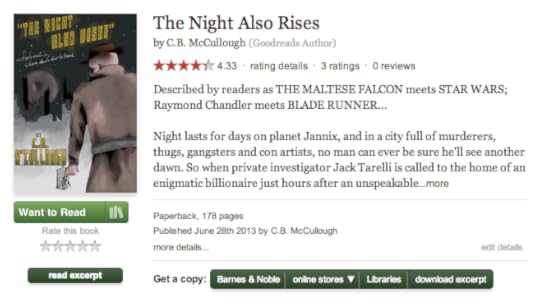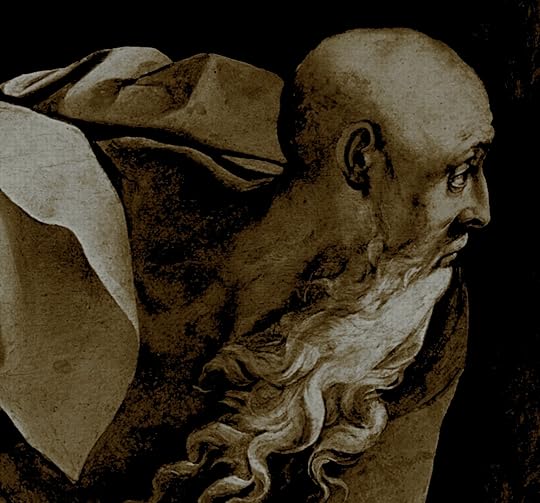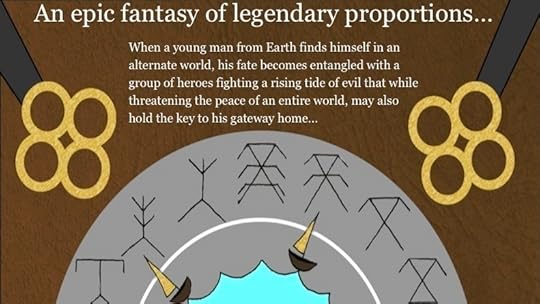C.B. McCullough's Blog, page 7
October 2, 2013
Wind, Tide, Squall and Foe: New Worlds in Fantasy Fiction
Kings and queens in stone-walled castles. Armies engaging on sweeping fields of battle, and armored knights leading infantrymen to victory.
It’s incredible how many titles in the Fantasy genre the above blurb could be describing– begging the question: What if all that changed?
Whether in books, movies, graphic novels or video games, the tried-and-true system of kings, castles and armies has become a staple of Fantasy. In previous posts, I’ve examined fictional cultures from an anthropological perspective. Today, I’ll explore how environment affects society, and we’ll see what happens when battlefields, castles, armies and kings are replaced with oceans, islands, navies and admirals– when the monarchy becomes the thalassocracy.
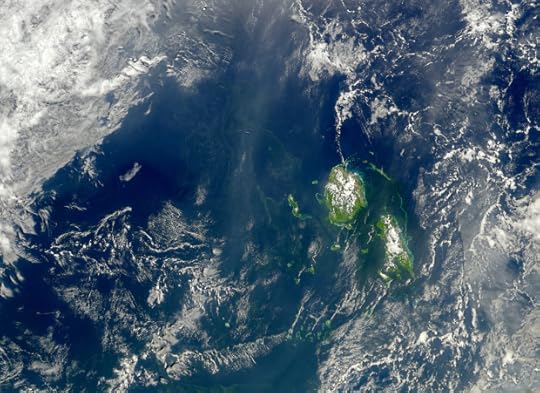
Rule of the Sea
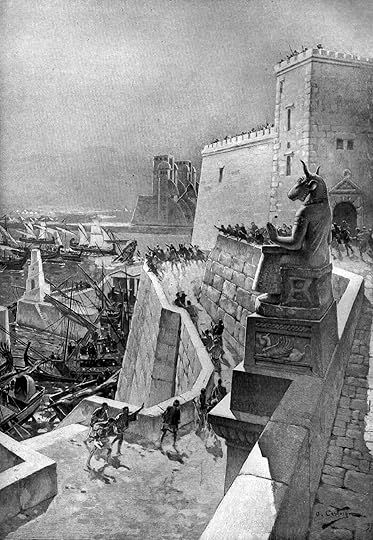
The Siege of Tyre, 332 BC
In the ancient Greek language, the word thalassocracy means “rule of the sea”, and implies supremacy by naval might. In the ancient Mediterranean world– made up of islands, shorelines, trade routes and archipelagos– an army was only as good as the land on which it could fight, making naval power equally, if not far more important.
Historians once gave the title of thalassocracy to the powerful and highly organized society of Minoan Crete, but use of the word in reference to the Minoans has since become criticized. (The term has occasionally been used interchangeably with the concept of naval supremacy, but the defining quality of a true thalassocracy is its absolute dependence on its navy; without a naval presence, the entire system would collapse.) A better example is the Mycenaean society, who controlled the Peloponnese and its surrounding archipelago from 1600 – 1100 BC and dominated the Aegean Sea. But perhaps the most well-known example of a thalassocracy is that of the Phoenicians, whose trade routes extended across the entirety of the Mediterranean Sea, connecting Lebanon with Egypt, and ruling over city-states along the shorelines of Asia Minor, Africa and even parts of modern-day Spain.
The Mythaeans
The Mythaean Thalassocracy is a political entity within the fantasy world of the novel, The Fallen Odyssey. With a logistical network of sea lanes and vast navies to protect them, the Mythaeans control the subtropical Raedittean Sea, along with any and all trade that passes through it. The word Mythaean at once refers to the society as a whole, as well as the ethnic/cultural group of its people. In its early days, the thalassocracy was an empire, with the entirety of the archipelago consolidated under centralized rule to repel barbarian invasions from the north.
“Through wind and tide and squall and foe, we shall ever journey on.” - Mythaean motto, from The Fallen Odyssey
In the time of The Fallen Odyssey, the Mythaean Thalassocracy has become a loose confederation of city-states ruled by noble-blooded Counts and Admirals. As with Greek city-states in the ancient world, most Mythaean colonies pay tribute to mother cities but are otherwise left to govern themselves. This makes disputes common, and naval skirmishes between city-states are an ordinary occurrence. Coupled with their proclivity for driving out and sometimes enslaving native, island populations, infighting among the Mythaeans has given them a reputation as a cruel, barbaric and warlike people; some might argue it is a reputation they not only embrace, but actively cultivate. If you’ve enjoyed this post, check out more articles on the world of The Fallen Odyssey by C.B. McCullough, or start your own odyssey, on Kindle or in paperback, today.
Ever journey on.
- C.B.








September 19, 2013
Download Free C.B. McCullough Titles – Thursday/Friday
Available for free download: two C.B. McCullough titles: The Path Less Traveled, and The Night Also Rises. (The last time ever for TNAR).
The Path Less Traveled
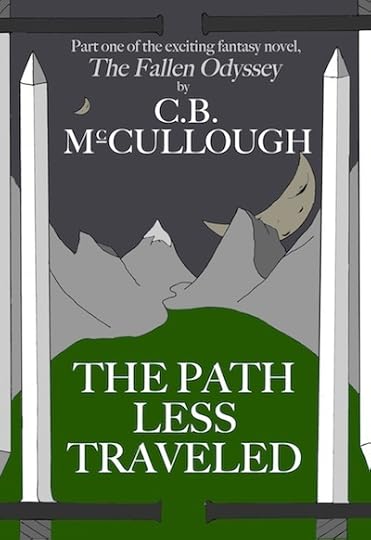 From C.B. MCCULLOUGH comes a thrilling adventure for young adults and experienced readers alike. The odyssey begins in THE PATH LESS TRAVELED, a sample of the epic fantasy novel THE FALLEN ODYSSEY…
From C.B. MCCULLOUGH comes a thrilling adventure for young adults and experienced readers alike. The odyssey begins in THE PATH LESS TRAVELED, a sample of the epic fantasy novel THE FALLEN ODYSSEY…
When seventeen-year-old Justin Holmes wakes from a strange, amnesic slumber, he finds himself in an unknown land, far from his rural Pennsylvania hometown. With no memory of how he came to be in this world of vast grasslands, sky-scraping mountains and double moons, he can but cling for dear life to his only allies: an illusive old hermit, and a cold-blooded, duplicitous mercenary.
When unwillingly recruited to help rescue a kidnapped princess, Justin is whisked off into the wild on an otherworldly adventure, all while struggling to learn what twist of fate has landed him in this strange, alternate dimension. He can only hope that within the wilderness of this fantasy world can be found some clue that will lead him home.
Trapped in this medieval realm of prehistoric animals and powerful warriors, Justin must uncover his destiny on his trek down THE PATH LESS TRAVELED…
Word Count: 15,500 (about 50 printed, paperback pages)
Part 1 of a 10 part novel
The Night Also Rises
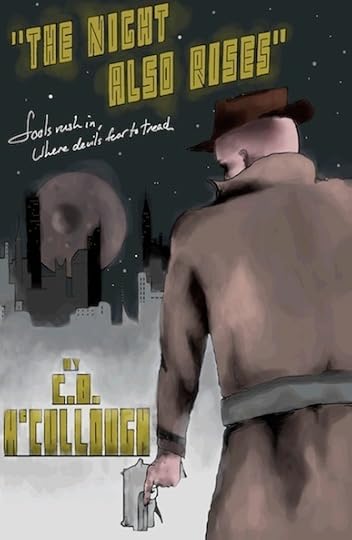 Described by readers as THE MALTESE FALCON meets STAR WARS; Raymond Chandler meets BLADE RUNNER…
Described by readers as THE MALTESE FALCON meets STAR WARS; Raymond Chandler meets BLADE RUNNER…
Night lasts for days on planet Jannix, and in a city full of murderers, thugs, gangsters and con artists, no man can ever be sure he’ll see another dawn. So when private investigator Jack Tarelli is called to the home of an enigmatic billionaire just hours after an unspeakable murder, he knows a long, long night has only just begun.
Led on a chase into the shadowy underbelly of a city that never wakes, the hard-nosed and uncompromising Jack will stop at nothing to track down a deadly killer whose motives are shrouded in corruption, betrayal and deceit. But as connections to Jack’s own dark and mysterious past arise, it becomes clear that this is more than a search for answers; it’s a race against time.
Drawing on the classic noir style, THE NIGHT ALSO RISES is an exciting new take on the hardboiled detective novel; a daring combination of science fiction and mystery like you’ve never seen before.
Fools rush in where devils fear to tread…








September 12, 2013
Goodreads Giveaway: THE NIGHT ALSO RISES – Ends at Midnight
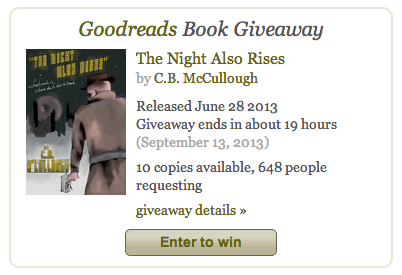 Today (Thursday, Sept. 12) is the last day to get a signed, paperback copy of The Night Also Rises for free. Enter for your chance to win one of 10 copies of this new science-fiction/noir mystery novel by C.B. McCullough. Just go to Goodreads.com, or click the image to the right. It’s free to enter and free to win– no strings attached.
Today (Thursday, Sept. 12) is the last day to get a signed, paperback copy of The Night Also Rises for free. Enter for your chance to win one of 10 copies of this new science-fiction/noir mystery novel by C.B. McCullough. Just go to Goodreads.com, or click the image to the right. It’s free to enter and free to win– no strings attached.
Drawing on the classic film noir style, The Night Also Rises is an exciting new take on the hardboiled detective novel; a combination of science fiction and mystery like you’ve never seen before.
“This city’s home to a billion and one stories. Life and death hold hands and walk the streets like wanton lovers. Mine’s a tale woven of pain and trouble. But it’s mine, and it’s now, and it’s all I got left…”
Still not sure? Check out the official video trailer for The Night Also Rises.
Available in paperback and ebook format.
“Fools rush in where devils fear to tread…”








September 9, 2013
3 More Days: THE NIGHT ALSO RISES – Free Signed Copies in Paperback
For three more days, you can enter to win one of 10 signed, paperback copies of THE NIGHT ALSO RISES, the new science-fiction/noir mystery novel by C.B. McCullough.
Also available on Amazon and on Kindle.
“Fools rush in where devils fear to tread…”








August 26, 2013
The Central Mountain: Anthropology in Fantasy and the Creation of Fictional Cultures
In the Fantasy genre, fictional people are in abundance. But what about fictional peoples? I’m referring, of course, to societies; to culture.
In previous posts, I outlined some of the methods that I’ve used to transplant real-world wildlife into Fantasy settings in new and original ways. In this post, I explore the human element of the equation; namely, the creation of cultures, ethnic groups and (for lack of a better word) races in fantasy fiction. As an example, we’ll take a look at the Cru.
The Cru
“Their creation lore tells of ancestors who were born below the earth and ventured above ground to see the sky. They fell so in love with the sky that when they tried to return home below the earth, their eyes could no longer see the way. They became trapped above ground, and their home was lost to them.” - from The Fallen Odyssey
Cru is a simplified version of the name of a (fictional) ethnic group within the world of The Fallen Odyssey. The people self-identify as A’cru’u'ol, which means “the trapped people”. The Cru subsist mostly on animal protein, keeping bison, cattle and sheep as livestock.
Lifestyle
Far from your typical stock fantasy society (usually poor farmers living in hamlets clustered around an urban center), the Cru are migrating herders who practice transhumant pastoralism.
A quick note: Transhumance is not to be confused with the nomadic, tribal lifestyle that might come to mind. Rather, transhumance deals with a seasonal migration of a community from one, specific semi-permanent residence to another. During the winter months, for example, the Cru live on grassy, lowland plains where temperatures remain cool– usually staying above freezing. When summer comes, they migrate into the fertile, high-altitude valleys in the mountains to take up residence in dwellings of wood and sod; an ideal lifestyle for their animals.
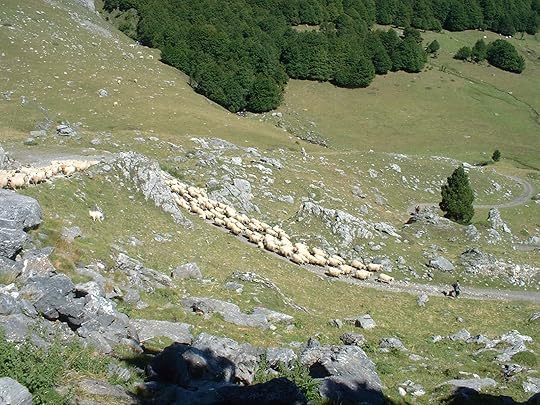
Photo courtesy of Wikimedia Commons, Originally uploaded by Clicgauche at fr.wikipedia
Physical Appearance
“Finally, the approaching riders came up the rise and slowed their galloping steeds to a trot. Both were men, and both rode without saddles. Hanging over their bodies were thick furs… Although their faces were woolly with bristly beards, their heads were shaven completely bare. Their eyes were large and wide and seemed to glisten as if always close to tears. Their skin was the rich brown– almost black– of fertile soil.” - from The Fallen Odyssey
Religion
Ruled by a council of elders, the Cru religion centers around prophets– individuals gifted with visions of the possible future. The chief responsibility of the council is to interpret these prophecies and determine appropriate action. At the core of their belief system is the notion of the central mountain– a concept borrowed from the Plains Indians of North America (and sometimes using a hoop as the metaphor for all worldly visual and physical experiences).
“Within the Cru community,” said Zechariah, “sensitive individuals are trained to become prophets. They are religious leaders who live apart from the rest of the Cru, on a hidden peak within the mountains. They call this peak the central mountain, and they consider it the central point of the world; the axis on which rotates the planet, the stars, the galaxies, all of time and space. Somewhere beneath this mountain is their ancestral home; the utopian world which they left long ago and cannot return to, except in death, when their souls rejoin God under the mountain. But the concept goes a step further, in that everyone carries their own central mountain with them. Every person is the center– the rotating axis– of his own worldly experiences. In other words, every man sees the world from the summit of his own mountaintop.” - from The Fallen Odyssey
Conclusion
For as exotic and imaginative as Fantasy worlds can be, it continues to be a genre where cultural diversity is noticeably lacking. Eurocentrism seems to have a perpetual stranglehold on it. Thankfully, some series have given important roles to more traditional cultures (like the Dothraki people in George R.R. Martin’s A Game of Thrones, or the Mud People in Terry Goodkind’s Wizard’s First Rule and its sequels).
Although world-building can be fun, writers should be careful not to go overboard. In developing the lifestyle, religion and physical characteristics of a fictional culture (or race), it can be tempting to create and create and create, and write and write and write. But as interesting as the creative process is, trust me when I tell you that nobody wants to read a self-indulgent ethnography of your fictional culture. Like the central mountain of Cru mythology, there is a central point to every story. Stray too far from it, and you risk getting lost in the wilderness.
“You are your central mountain, and with it, you are always home. But remember: the strong man forges new paths, carrying with him the peace of the knowledge that while he may plan his way, the spirit guides his feet.”
- C.B.








August 16, 2013
The Night Also Rises – Book Trailer
August 14, 2013
Goodreads Book Giveaways – To Give or Not To Give?

20 million members. 570 million books.
No doubt about it: Goodreads is the premier website for book-lovers, turning reading– a normally solitary action– into a community-based, social media experience. But Goodreads has also become an important destination for authors looking to promote their work and connect with readers. With the Goodreads author program, writers are given the (free) opportunity to create a unique author page, connect with fans, share their favorite books, and promote their work through paid advertising and book giveaways.
Book giveaways are a specifically popular option for authors, for several reasons.
1. The “To Read” Shelf
When Goodreads users add a title to their “To Read” shelf, it announces– to friends and any other connected users– their intention to read the book. As such, landing on readers’ To Read shelves quickly and easily increases a book’s visibility. As an example: within 24 hours of my giveaway for The Night Also Rises going live, 128 people had requested copies, and 53 people added it to their To Read shelf, without any other advertising or promotion whatsoever. Not a bad bit of exposure!
Now, seller beware: seeing readers who intend “To Read” your book can be exciting, but the turnover on this is far from 100%. Upon entering giveaways, a lot of users automatically add the book to their To Read shelf. If they don’t win that free copy, there’s no guarantee they’re going to buy it. And, hey, who am I to judge? The real-life To Read shelf in my house is heavy enough to crush diamonds. The point is, don’t be disappointed if Good-readers’ good intentions don’t immediately translate into good sales.
2. Sales (duh!)
Giving your book away is a good source of exposure. Exposure leads to interest, and interest– if you’re lucky– leads to sales.
It’s surprisingly easy to forget sometimes that the endgame of a marketing campaign is to sell your stuff. (What a novel idea– pun most certainly intended.)
For creative individuals, marketing can sometimes sound like a dirty word. Writers naturally want to get the word out about a book, but for some, the idea of promoting their own work seems shamelessly self-serving. (Overheard: “I won’t push it down anybody’s throat. It speaks for itself!”) If you’re one of these people, take a deep breath and repeat after me: “My work has value.”
3. The Prospect of Reviews
One of the big selling-points of the Goodreads giveaway program is the prospect of gaining reviews from the winning users. According to Goodreads, readers who receive a book for free are more likely to write a review, and– as we all know– new authors are just dying for reviews.
Now, I purposefully saved this one for last, as it is a widely-accepted theory among self-publishers that good reviews translate into sales. This is a notion about which I am more than a little skeptical…
Personally, when shopping for a book, I read the description, and then I read an excerpt. Very rarely do I read customer reviews. Maybe I’m just weird, but the personal preferences of others don’t play much of a role in my own.
Anybody with the ability to press “Send” can be a critic; not all of them are worth placing stock in– or even acknowledging. Customers who take it as a personal affront when authors neglect their every want and whim are more than happy to tell the world all about it. (Over 10% of Amazon customer reviews for The Catcher in the Rye– widely accepted by critics as one of the greatest books of the 20th century– are 1-star reviews.)
Many writers crave reviews, but it really isn’t much of an objective for me. As a reader, I rarely read reviews, and as a writer, I absolutely refuse to beg, plead or pay for them. (For God’s sake, please don’t pay for reviews. It’s just sad.) Great reviews may help you gain exposure, but great content is the only thing that really sells.
To Give… Or Not to Give?
In the end, Goodreads will randomly draw the giveaway winners. It is then the responsibility of the person running the giveaway to get books into the winners’ hands. Authors are allowed to give away as few as a single book, but Goodreads recommends you do at least 10. I’m currently giving away 10 free copies of The Night Also Rises, over the course of a 1-month contest. We’ll see how it goes!
As with any marketing campaign, the Goodreads giveaway program carries risks. Your quest for reviews might backfire, resulting in nauseating, single-star heartbreaks. And, of course, you run the risk of not gaining enough return on your investment (the cost of printing all those books you’re handing out). But if all goes well, mayhap it is truly better to give than to receive.








August 1, 2013
The Reviews Are In – What Readers Are Saying About The Fallen Odyssey
“Epic, serious fantasy.”
“Grabbed me and wouldn’t let go. Even when I put it down, I couldn’t stop thinking about it.”
“Breaks the mold. Just as much about the human condition as a classic adventure in a world far away.”
“One of those few elite books that don’t have a low point. There is no part of the book that gets dull and monotonous. As it progresses, the plot becomes even more enticing, making the book harder to put down the more you read! C.B. McCullough really keeps the reader guessing and entertained… I truly felt like I was watching every event in the plot take place. He incorporated everything he wrote in the book– nothing was ‘fluff’, and I can’t wait to see what he comes up with next!”
“Unquestionably the best (and most original) independent fantasy novel I’ve read. Easily 5 Stars. Now very much looking forward to the next book!”
“A fantastic story describing a young man’s internal conflicts between doing what he wants and doing what is right… The magical system is unique and extensive; the battles are detailed and compelling, and the world is full of ancient mysteries.”
“Far too many pages dedicated to describing in tiring detail the various fight scenes. Other readers might lap this up, but I admit to barely skimming through those sections.”
“Last page made my jaw drop.”








July 25, 2013
Write Boldly
“Some, dreading that awareness of how they do what they do would cripple their spontaneity, never study the craft. Instead, they march along in a lockstep of unconscious habit, thinking it’s instinct. Their dreams of creating unique works of power and wonder are seldom, if ever, realized. They put in long, tough days, for no matter how it’s taken, the writer’s road is never smooth, and because they have a gift, from time to time their efforts draw applause, but in their secret selves they know they’re just taking talent for a walk… Write every day, line by line, page by page, hour by hour… Do this despite fear. For above all else, beyond imagination and skill, what the world asks of you is courage, courage to risk rejection, ridicule and failure. As you follow the quest for stories told with meaning and beauty, study thoughtfully but write boldly.” - Robert McKee

Photo courtesy of Tom Murphy VII









